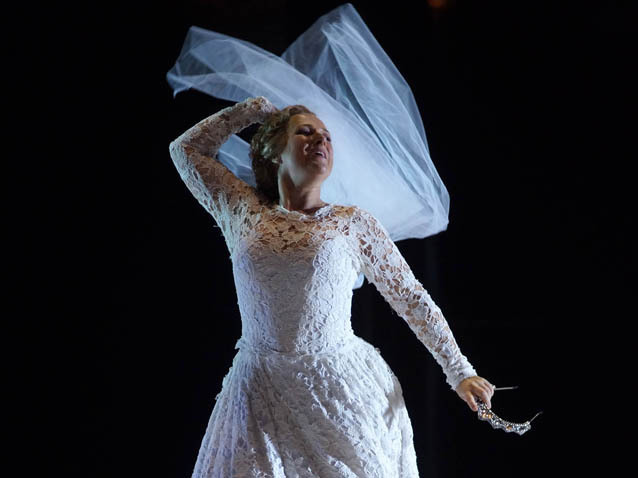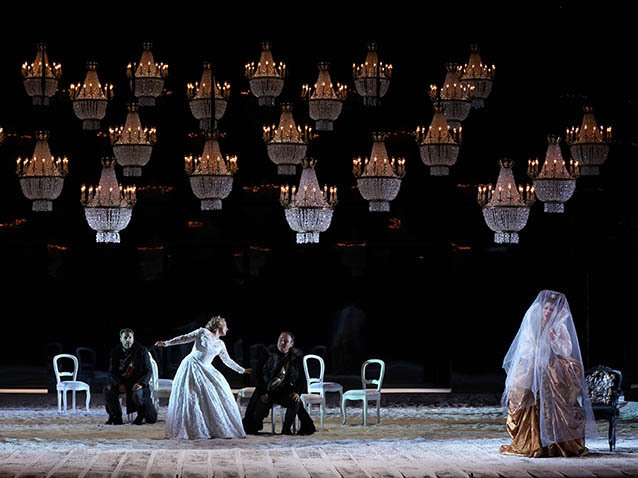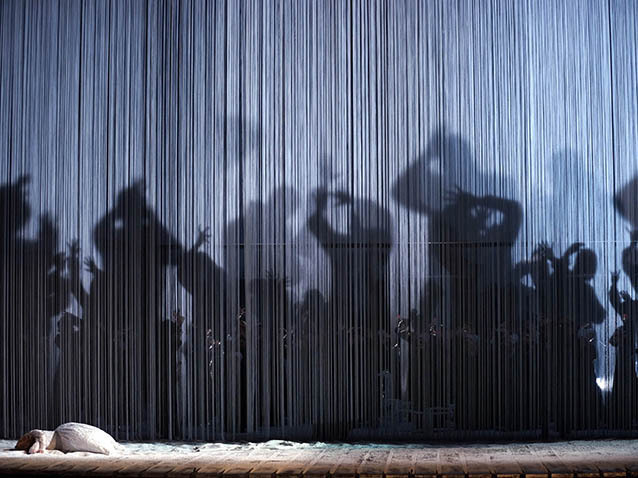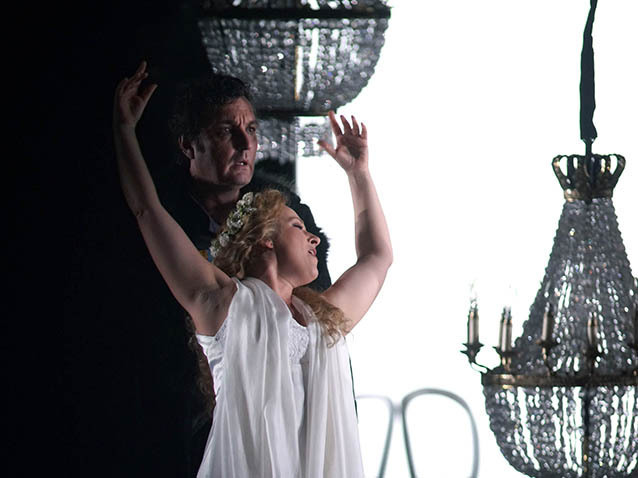 © DR
© DR
As an extra gift we had the new critical edition by Fabrizio della Seta (with certain changes). Thus the roles of Enrichetta and –more- Arturo, but also those of Riccardo and Elvira become more alive (a pity that they didn’t include the final rondo written for Malibran, and more since here we had a real chance). Of course the risks of a still less dramatic structure –a problem with this opera since its first performance- are more evident, but the artistic interest of this choice was well worth.
I’ve never seen until now the exploit which means trying to put together not one but two casts for a so difficult opera: finding only one golden quartet capable of more or less matching the one of the first interpreters (Grisi, Rubini, Tamburini, Lablache, also known as ‘the Puritani quartet’) has been always almost impossible. Well then, at the two performances on July 6th.and 7th.we’ve been very close, particularly with the first cast.


In human life and experience nothing is perfect. The production by Emilio Sagi was conventional (not a sin in itself, furthermore with this kind of opera), but the almost constant presence of extras doing everything and more while the choir stood just sitting, quiet and almost as in a concert performance was disturbing. There were also lots of chandeliers (going up and down dependingon the joy or sadness of the situations), epoque costumes but a perfunctory minimal scenery (most convenient for quick changes at least) and a bland stage direction (it depended more on the particular artist than on an clear idea). The weaker and/or most irritating aspect, though, was Evelino Pidò’s conducting (it came as a real surprise, because he’s reputedly a belcanto specialist –think of the lot of thing he’s done and mostly well with Dessay) : noisy, mostly fast (apart from sudden ritardandi here and there to no avail), often at metronome pace (mostly in the whole beginning of second act: ‘Piangon le ciglia’, the best of all choirs in the opera –they tend to be too long and monotonous, but Peppoli’s libretto was hard to swallow even for Bellini- and the following air, ‘Cinta di fiori’, the biggest solo moment for the bass) and, worst of all, not only once fighting the voices on stage (of course there were no Wagner singers there; it was a real luck that the Real is not the biggest of opera houses).
The choir, well instructed by Andrés Máspero, after some hesitation in the beginning, sang very well, but always more on the strong side, either because the baton asked for that or because they wanted to make themselves heard –the same happened with most of the soloist, if not all ....and it was a good thing that they happened to possess bigger or very well projected voices as usual in this repertoire. It’s hard to accept the fact that today’s ‘divi’ try to impose an obedient conductor who will follow their caprices, but sometimes it’s more than understandable…
Venera Gimadieva was a delightful surprise: a ‘liricoleggero’ with a crystal-clear voice and its own peculiarity, a high register with no visible effort, good technician (she only lacks a better command of thrills) and her control of breadth is excellent; add to all this the fact that she has an appealing figure and is a competent actress.
But ‘la’ Damrau (always far more interesting in a complete opera than in recitals composed by fragments ‘ad majorem gloriam’) was absolutely superb, unforgettable(and there you can find all the thrills, the ‘glissandi’, and the whole craft of the great ‘coloratura’), and the more so because, apart from the voice, she offered an Elvira that was a unique dramatic creature (the best I’ve ever seen on stage until now): not merely an artillery of vocal tricks but a fragile young lady, neurotic and not ‘simply’ crazy. She was announced unwell: I can’t think what she could achieve had she been in good health.
Celso Albelo has no doubt a very intense, almost robust, voice, and that could be thought a clear advantage for the dangerous role of Arturo. Even if he was in far better voice than in his recent Tebaldo in Capuletti at Barcelone, and even if he dared (with success) the feared ‘F’ in the last act, you could tell from his first note that the voice was under pressure, without the effortless character that was always his, and so, at the always anxiously waited climax of ‘A te, o cara’, he had a most unwelcome problem with intonation. The breadth was good, but shorter than usually. Maybe, let’s hope, it’s only one of those moments in a singer’s career: we can’t do without a tenor of his level.
Javier Camarena hasn’t dared the ‘F', but, having said that it would be advisable not to sing very often this role when there are so many waiting for his services, he was nothing short than perfect, astonishingly at ease all the time, singing beautifully with a magnificent quality of tone, a unique technique (just watching the position every time one of those terrible high notes came was a feast in itself), a phrasing of a great stylist and an sympathetic and ardent actor, as was the case with Albelo.
As for the baritones, the difference was bigger. George Petean is a singer with a generous voice, correct but uninspiring, the agilities were a bit messy, the last note of the big duetto at the end of the second act difficult. Even as an actor he was, at his best, only average.

On the other hand Ludovic Tézier, whom some distinguished critics found excessively ‘Verdian’ (the same voices had said years ago that his was not a voice for Verdi….), was just fabulous : of course his voice is with every year darker, bigger, heavier, but he succeeded in bringing forward the melancholy and despair of his first great difficult scene showing full aplomb. If you demand here a lighter clearer voice (there are some recent examples in Italy, and the end was not good) afterwards the singer is confronted with the whole second act (the third being irrelevant) which requires, well yes, the means of a Verdi baritone (You can always hope for the resurrection of, say, Mattia Battistini –and I would be certainly delighted- but it seems not feasible). Tézier sang with nobility, in full respect of the score, and, which is equally important, a proper accent and mastered the phrasing (as a Verdi baritone perhaps?), ringing top notes bue also an impressive medium and low register and he was not at all bad as an actor.
You could also easily mark the difference between the two basses. This time the best one was in the second cast: Roberto Tagliavini need only a more heavy and round low register (it was very clear at the end of his big aria), but for the rest he mastered the role of Giorgio in a more solid way than Nicolas Testé, whose volume was scarce and the timbre lighter, even if his appearance and elegance were a joy for the eye.
Cassandre Berthon offered a good Enrichetta, but she was punished by the tessitura (the role was written for a mezzo, no for a soprano) and above all by the orchestra. Even the magnificent Annalisa Stroppa (a real mezzo, and thus more comfortable, for a part that now is too small for her) was unmercifully covered in one or two moments. Both singers were a sympathetic portrait of the unfortunate queen.
The less said the better about Valton -Miklós Sebestyén : good stuff which requires hard work- and particularly Bruno (Antonio Lozano).
More public for the first cast, but curiously in both nights they showed their approval during the performance ; at the end, instead, after a little while of wild applause for everybody, they left. The singers deserved more if not better.
Jorge Binaghi
the 11 of July, 2016 | Print
Comments